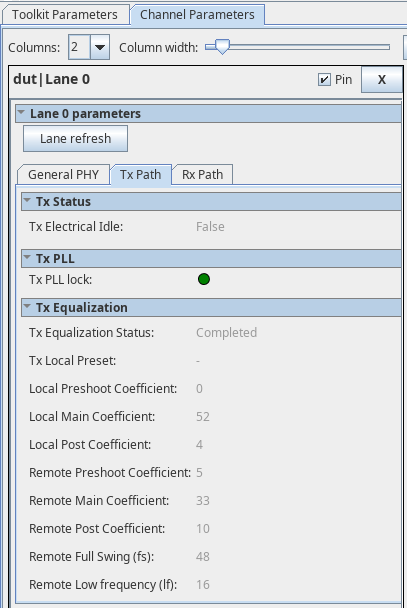Visible to Intel only — GUID: rwp1637023783395
Ixiasoft
Visible to Intel only — GUID: rwp1637023783395
Ixiasoft
8.2.4.3.2. TX Path
This tab allows you to monitor the transmitter settings for the channel selected.
| Parameters | Values | Descriptions | |
|---|---|---|---|
| TX Status | TX Electrical Idle | True, False | Indicates if TX is in electrical idle. True: indicates TX is in electrical idle. False: indicates TX is out of electrical idle. |
| TX PLL | TX PLL lock | Green, Red | Indicates if TX PLL is locked. Green: TX PLL is locked. Red: TX PLL is not locked. |
| TX Equalization | TX Equalization Status | Not attempted, Completed, Unsuccessful | Indicates transmitter equalization status. The TX local and remote parameters are valid only when the value of Equalization status is returned as completed, indicating equalization has completed successfully. |
| TX Local Preset | P0 to P10 | Indicates the F-tile transmitter driver preset value as requested by the link partner during the Equalization phase of link training. If the preset is not one of these values, then no value is shown. | |
| Local Pre-shoot coefficient | Depends on the coefficient requested by the link partner. |
Indicates F-tile transmitter driver output pre-emphasis (pre-cursor coefficient value). |
|
| Local main coefficient | Depends on the coefficient requested by the link partner. |
Indicates F-tile transmitter driver output pre-emphasis (main cursor coefficient value). |
|
| Local post coefficient | Depends on the coefficient requested by the link partner. |
Indicates F-tile transmitter driver output pre-emphasis (post-cursor coefficient value). |
|
| Remote Pre-shoot coefficient (†) | Depends on the transmitter driver output of the link partner. | Indicates link partner's transmitter driver's output pre-cursor coefficient value, as received by F-tile during the Equalization phase of link training. When F-tile is configured in Endpoint mode, this value corresponds to the coefficient received during Phase 2 of Equalization. |
|
| Remote main coefficient (†) | Depends on the transmitter driver output of the link partner. | Indicates link partner's transmitter driver's output main cursor coefficient value, as received by F-Tile during the Equalization phase of link training. When F-Tile is configured in Endpoint mode, this value corresponds to the coefficient received during Phase 2 of Equalization. |
|
| Remote post coefficient (†) | Depends on the transmitter driver output of the link partner. | Indicates the link partner's transmitter driver's output post-cursor coefficient value, as received by F-Tile during the Equalization phase of link training. When F-Tile is configured in Endpoint mode, this value corresponds to the coefficient received during Phase 2 of Equalization. | |
| Remote full swing (fs) (†) | Depends on the device capability of the link partner. | Indicates the full swing value used by the link partner during the Equalization phase of link training. | |
| Remote low frequency (lf) (†) | Depends on the device capability of the link partner. | Indicates the low frequency value used by the link partner during the Equalization phase of link training. |
